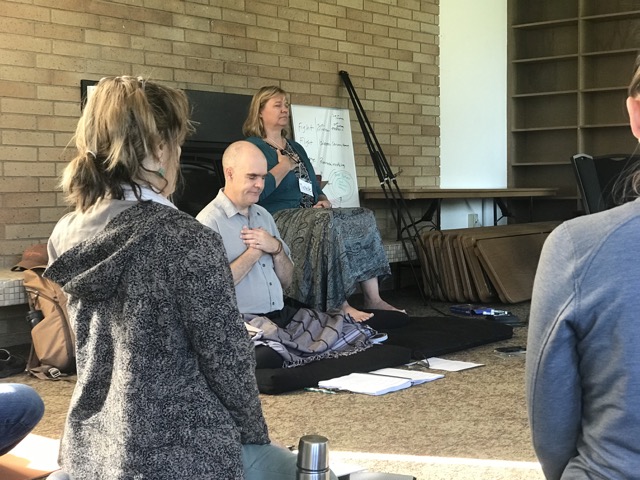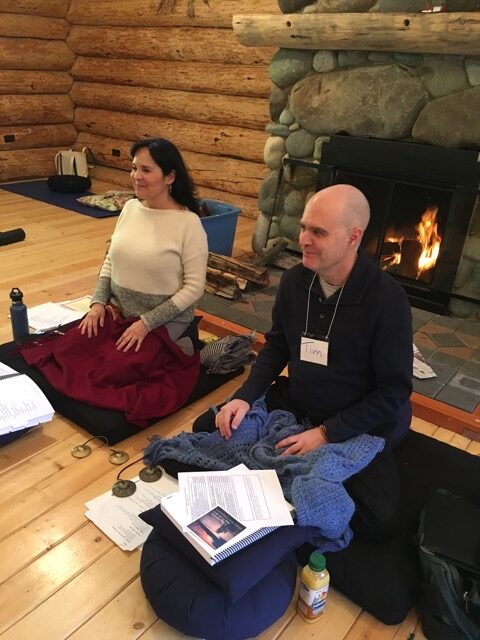Programs
Explore our mindfulness and compassion programs
Search | Drop-In | Living | MBSR | MSC | Healthcare | Retreats | Continuing Education | Teacher Training | Going Deeper | Printable Schedule
Multi-Day Mindfulness Meditation Retreats

Fierce Compassion: Womenʹs Retreat
Taking time away from our busy lives can give us the space to deeply connect with our experience, get acquainted with our true selves, see things differently, and reinvigorate mindfulness practice. Practicing with a group of people across several days can provide a unique sense of community and support that can last long after the retreat concludes.
Multi-day retreats also give us the chance to slow down, disconnect from technology, and reconnect with the natural cycles of the world. Join us for these multi-day deep dives into practice led by well-seasoned teachers.
We’ve developed partnerships with beautiful and accessible retreat centers in Western Washington where we offer two types of multi-day practice experiences:
At our mostly silent meditation retreats (online or in-person), you’ll be guided through sitting meditation, the body scan, walking meditation (indoors and out), gentle mindful movement, and contemplative practices like loving-kindness meditation.
Multi-day in-person retreats are held largely in supportive silence creating space for a deep immersion in the practice. Guidance from our teachers is always available.
Retreats are ideal for people with some mindfulness or meditation experience. For those newer to mindfulness we recommend starting with a class or a single day retreat.
The teachers are lovely, gentle, incredibly supportive, and clearly knowledgeable about mindfulness and how it can support us in our lives.
You Are Welcome Here
Everyone is welcome at Mindfulness Northwest, regardless of race, religion, age, ability, gender expression, who you love, what you believe -- everyone. We at Mindfulness NW work hard to make our spaces safe for all, and we thank you for joining us with that same intention.
Below find detailed descriptions of the three types of multi-day retreats and trainings we offer. For single day retreats please click here.
Is a retreat right for you?
WHO OUR ONE DAY RETREATS ARE FOR
Our single day retreats are ideal for people with some mindfulness or meditation experience. Introductory information about mindfulness will not be provided at this session. Rather, we will dive right in to guided practice. If you are totally new to meditation this day may be a challenge; however, all are welcome. For some, “jumping in” is a great way to start!
WHO OUR MULTI-DAY RETREATS ARE FOR
Before sitting a multi-day retreat we recommend that you have teacher-led experience with mindfulness or related contemplative practices. Please contact us if you have questions about whether a given retreat will be appropriate for you.
Our multi-day retreats are appropriate for:
- Those who have taken a course in mindfulness such as Mindfulness-Based Stress Reduction, Mindful Self-Compassion, or Mindfulness for Healthcare Professionals.
- Established students of mindfulness interested in deepening and maintaining their practice.
- Self-taught mindfulness students usually do just fine if they've established a regular practice over at least a few months.
- Mindfulness teachers and students who’d like to strengthen their understanding of the Buddhist roots of contemporary mindfulness.
- Those seeking to fulfill a required teacher-led silent retreat for a teacher training: our 5 and 7 retreats fulfill this requirement for all of the major mindfulness teacher trainings we're aware of.
- Adults age 18 and over.
About Our Multi-Day Silent Retreats
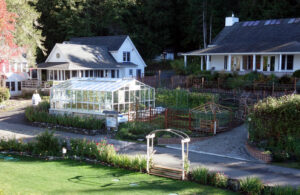
WHO COMES TO RETREATS?
All are welcome! We are honored to support each participant in their meditation practice regardless of their nationality, ethnicity, race, color, gender, gender identity, sexual identity, age, physical ability, political affiliation, or religion. Our retreats are suitable for beginning through experienced practitioners.
We are committed to offering support for any accessibility needs you have as we are able. Please contact us prior to registering for a course.
YOUR FIRST LONGER RETREAT?
Before sitting a multi-day retreat we recommend that you have teacher-led experience with mindfulness or related contemplative practices. Please contact us if you have questions about whether this retreat will be appropriate for you.
IS RETREAT RIGHT FOR YOU? Meditation retreats are not right for everyone. If you have a history of trauma or acute psychological issues, consider checking with a mental health professional to decide if intensive retreat practice would be supportive. If you have questions or concerns about whether a retreat is right for you, please contact us at office@mindfulnessnorthwest.com.
STRUCTURE AND PARTICIPATION
FOUR DAILY PRACTICE SESSIONS
- Mindfulness and compassion practices are offered in four blocks daily: early morning, morning, afternoon, and evening.
- Participants are expected to attend all sessions and follow the printed schedule you will receive on site as fully as possible. However, we are flexible and always willing to work with you on what your body and mind can reasonably do. Speak with the retreat teachers if you have concerns about following the complete schedule.
PRACTICING IN SILENCE
- After the initial orientation and introductions on the first evening, our residential retreats are held in silence.
- Participants are expected to follow guidelines around silence and participation:
- Not speaking to other participants including close friends or partners you are attending with.
- Not using technology of any form.
- Not reading books, magazines, flyers, or any reading materials.
- Reducing interpersonal contact through the eyes or other body language.
- Necessary communication with the retreat teachers can be done via a notes station or by taking them aside.
The intention of silent retreat is to settle deeply into your own experience and to not interact with others, allowing everyone space to have the retreat they need to have -- including you!
PERSONAL AND INTERPERSONAL SAFETY
Participants are expected to be sensitive and responsive to these guidelines and the needs of fellow participants as fully as possible.
- Do not take photos or make recordings of other participants or the teachers.
- Do not use alcohol or mind altering drugs of any kind.
- Emergency contact information to share with loved ones will be sent to you. Venue staff and Mindfulness Northwest instructors will make sure you receive incoming messages promptly while your phone is off. If you are expecting an urgent message please let your instructor know.
- Instructors are available at all times to offer support, including conversation if needed.
 WHAT TO BRING
WHAT TO BRING
- Warm clothes in layers (sweater, jacket, raingear, etc.). Outdoor walking meditation may be a component of this retreat unless the weather is too challenging.
- Shoes that are (1) fine walking in damp grass and (2) slip-on if possible. We take shoes on and off frequently. Slippers for the practice room can also be nice to have.
- Toiletries and overnight things including a towel.
- Bringing your own bedding (pillows, sheets, blankets or sleeping bag) is required at some of our venues. Please check your registration confirmation email for this information.
- A flashlight can be helpful but venues are generally reasonably well lit. Sometimes there is walking between buildings in the early morning and evening.
- A yoga mat if you have a favorite. We are able to bring mats to share.
- Meditation cushions / supplies – if you have a meditation cushion(s), a bench or other sitting gear, feel free to bring it. We are able to bring a limited supply of cushions. Note that there are plenty of chairs available.
- An extra blanket or two for the meditation hall – nice for body scans and resting.
AFTER THE RETREAT
Silent mindfulness retreats can be psychologically powerful. It's not unusual to experience significant shifts in your mood and energy levels right after a retreat. We recommend that you closely monitor your "mental hygiene" by avoiding overstimulating environments or influences directly after the retreat (i.e. parties, loud events, violent content, harsh substances or emotionally straining company). You can support the integration of your retreat experience with activities like journaling/drawing, mindful movement, spending time in nature or even a shower/soak in a bath. If you feel "off" several days after your retreat we encourage you to seek out support. Don't hesitate to reach out to us at office@mindfulnessnorthwest.com to connect with one of our teachers.
About Our Online Silent Retreats
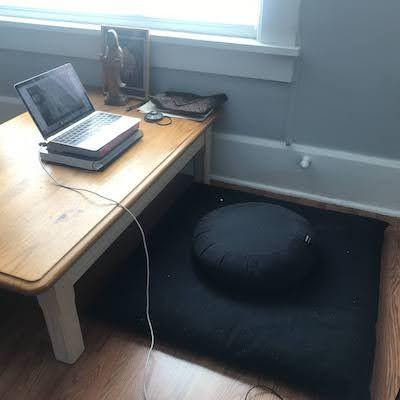
Below are a few suggestions to help you create an optimal retreat experience, realizing each of you has a unique home situation.
PREPARING FOR YOUR RETREAT AT HOME
- A quiet space - As much as possible, create a separate, quiet space away from family and distraction, even pets if they might distract you or other participants.
- Unplug - Plan to “unplug” from your phone, clocks, or any other electronic device unless using it to connect to our virtual retreat room. Turn off any notifications that might pop up on the device you're using to connect to the retreat.
- Free yourself up - Minimize or eliminate as many tasks and activities as you can. Normally we would be in a retreat setting to allow for an immersive experience. Retreating at home offers the benefit of being able to practice mindfulness skills in your regular environment while it offers the potential challenge of home distractions.
- Have a conversation ahead of time - We suggest that you prepare your household members ahead of time, letting them know you’ll be practicing silence during this time. If you're able to, maintaining silence or minimizing talk between practice periods (like we do at our in-person retreats) is a valuable contribution to the retreat experience.
- Explore integration and accept what happens - See an online retreat as an opportunity to integrate mindfulness practice and your daily life instead of as a way to “get away” – it helps to see this as a different type of experience from an in-person retreat at a retreat center.
- It won't be perfect - Resistance and wanting things to be other than they are can be a part of all contemplative practices. Please accept that the day will unfold in the way that it does and much is beyond your control. If things are busier or in some way not to your liking in the environment as you do the series of practices offered, please accept things as they are and know that there is benefit.
WE ASK THAT YOU:
- Sign in a little early to make sure you can connect.
- Turn cameras on once the retreat starts. This is not a requirement, but we've found that having cameras on best supports a rich and connected experience for all participants.
- Stay muted unless we are having a discussion.
- Maintain silence and focus as possible during practice times: refraining from speaking, reading, writing, or using other devices.
Following the guidelines supports a deep dive into practice for you and the entire community. Thank you.
About Our Residential Trainings
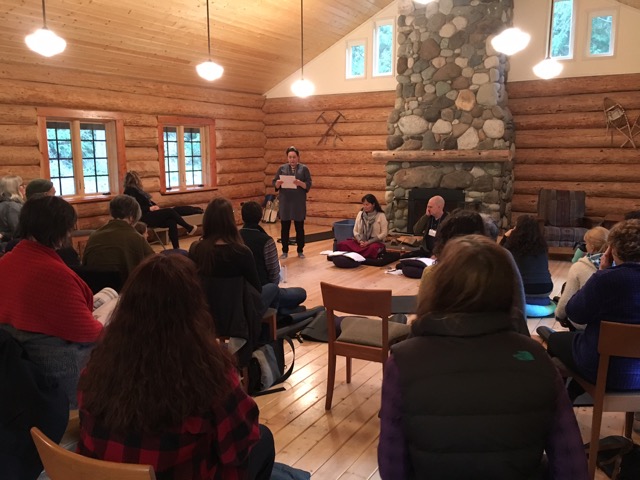
Residential Trainings are excellent if you cannot attend our 8-week classes or simply prefer the more intensive format and appreciate the way a Residential Training gets you away from your daily routine with space to focus.
We also offer silent teacher-led Residential Retreats. These are meditation retreats which consist primarily of silent meditation practice with some spoken guidance and brief talks from the teachers. Please see our Residential Silent Retreats section for more information.
STRUCTURE AND PARTICIPATION
A TRAINING DAY
Early morning practice starts our days before breakfast. Then 3-hour classroom sessions are offered morning and afternoon of most days. Evening sessions with additional resources and opportunities are offered on a few evenings as well. Participants are expected to attend all classroom sessions, but evening sessions are usually optional. You'll receive a printed schedule and guidance from the teachers about navigating these rich days of practice, study, and learning.
PERIODS OF SILENCE
Although our Residential Courses are interactive with talking, there are some periods of silence. Early morning and breakfast are usually held in silence, for example. Participants are expected to follow guidelines around silence and participation.
INTERPERSONAL SAFETY
Mindfulness and compassion training programs involve our personal stories and emotions. Instructors will work with the group to establish clear guidelines for safety. Participants are expected to be sensitive and responsive to these guidelines and the needs of fellow participants as fully as possible.
VENUE CHORES
To keep costs down, several of our venues ask that event participants wash dishes, sweep floors, clean bathrooms, and do other chores around the facility. We also do final clean up chores before leaving. We ask you to do chores as fully as you are able. If you have physical limitations we will help you find a suitable chore assignment.
REQUESTS OF YOU
- Arrive for the very beginning and stay to the end of the program.
- Follow the course schedule.
- Honor times of silence noted on the schedule: no reading, writing, or using devices during these times of silence.
- Please stay on campus unless invited to take an off-campus break by the instructors.
- Please do not use recreational drugs or intoxicants during any part of the training.
- Participants are asked to focus their energies and attention on the instruction and curriculum in order to get the most benefit from the week of training and in consideration of all participants.
- Do not take photos, video, or recordings of other participants or the instructors without their prior permission.
WHAT TO BRING
- Face masks – please check our COVID policy for our current guidelines around masking. While masks may not be required at your training, it's always a good idea to bring some.
- Warm clothes in layers (sweater, and jacket, etc) as we will be going in and out of doors as we move between buildings.
- Rain coat AND umbrella. This is the Pacific Northwest.
- Shoes that are (1) fine walking in damp grass and (2) slip-on if possible. We take shoes on and off frequently. Slippers for the practice room can also be nice to have.
- Toiletries and overnight things including a towel.
- Bringing your own bedding (pillows, sheets, blankets or sleeping bag) is required at most of our venues. Please check your registration confirmation email for this information.
- A flashlight can be helpful but venues are generally reasonably well lit. Sometimes there is walking between buildings in the early morning and evening.
- A yoga mat if you have a favorite. We are able to bring mats to share.
- Meditation cushions / supplies – if you have a meditation cushion(s), a bench or other sitting gear feel free to bring it. We are able to bring a limited supply of cushions. Note that there are plenty of chairs available.
- An extra blanket or two for the meditation hall – nice for body scans and resting.
- A notebook and pens like you would to any class or seminar.
WHAT’S NOT NEEDED
- Minimize electronic gadgets beyond what you need to take notes. We encourage you to consider reducing or disconnecting from phone, email, and text contact, but this is not required like it is in our silent residential retreats.
LODGING
Lodging assignments will be available on check-in at the course venue. You will have a room to yourself at most of our venues.
DIVERSITY & ACCESSIBILITY
We are honored to support each participant in their training regardless of their nationality, ethnicity, race, color, gender, gender identity, sexual identity, age, physical ability, political affiliation, or religion.
We are committed to offering support for any accessibility needs you have as we are able. Please contact us with any questions or requests related to accessibility prior to registering for a course.
AUDIO/VIDEO RECORDING TAKEN BY MINDFULNESS NORTHWEST
Audio/video recordings of our instructors may occasionally be created for certification and training purposes during these programs. These recordings will include only our instructors in the photo frame (though they may pick up student voices at some points in the recording) and are for internal use only.
We may also request your consent to take photos or videos for promotional purposes. Your image will not be captured or used without your consent.
About Our Online Trainings

Below are a few suggestions to help you create an optimal experience at your online mindfulness-based training, realizing each of you has a unique home situation.
PREPARING FOR YOUR TRAINING AT HOME
- A quiet space - As much as possible, create a separate, quiet space away from family and distraction, even pets if they might distract you or other participants.
- Free yourself up - Minimize or eliminate as many tasks and activities as you can. Normally we would be in a retreat-type setting to allow for an immersive experience. Doing mindfulness-based training at home offers the benefit of being able to practice mindfulness skills in your regular environment while it offers the potential challenge of home distractions.
- Have a conversation beforehand - We suggest that you prepare your household members beforehand, letting them know you’ll be in a focussed training with periods of silent meditation. Ask for support in maintaining a more settled space.
- Explore integration and accept what happens - See online training while at home as an opportunity to integrate mindfulness practice and your daily life instead of a way to “get away” – it helps to see this as a different type of experience from in-person studies at a retreat center.
- It won't be perfect - Resistance and wanting things to be other than they are can be a part of all learning environment. Please accept that the day will unfold in the way that it does and much is beyond your control. If things are busier or in some way not to your liking in the environment as you do the series of practices offered, please accept things as they are and know that there is benefit.
WE ASK THAT YOU:
- Turn cameras on during the training. This is not a requirement, but we've found that having cameras on best supports a rich and connected experience for all participants.
- Stay muted unless we are having a discussion.
- Be ready to participate as fully as you can.
Following the guidelines supports a deep dive into practice for you and the entire community. Thank you.





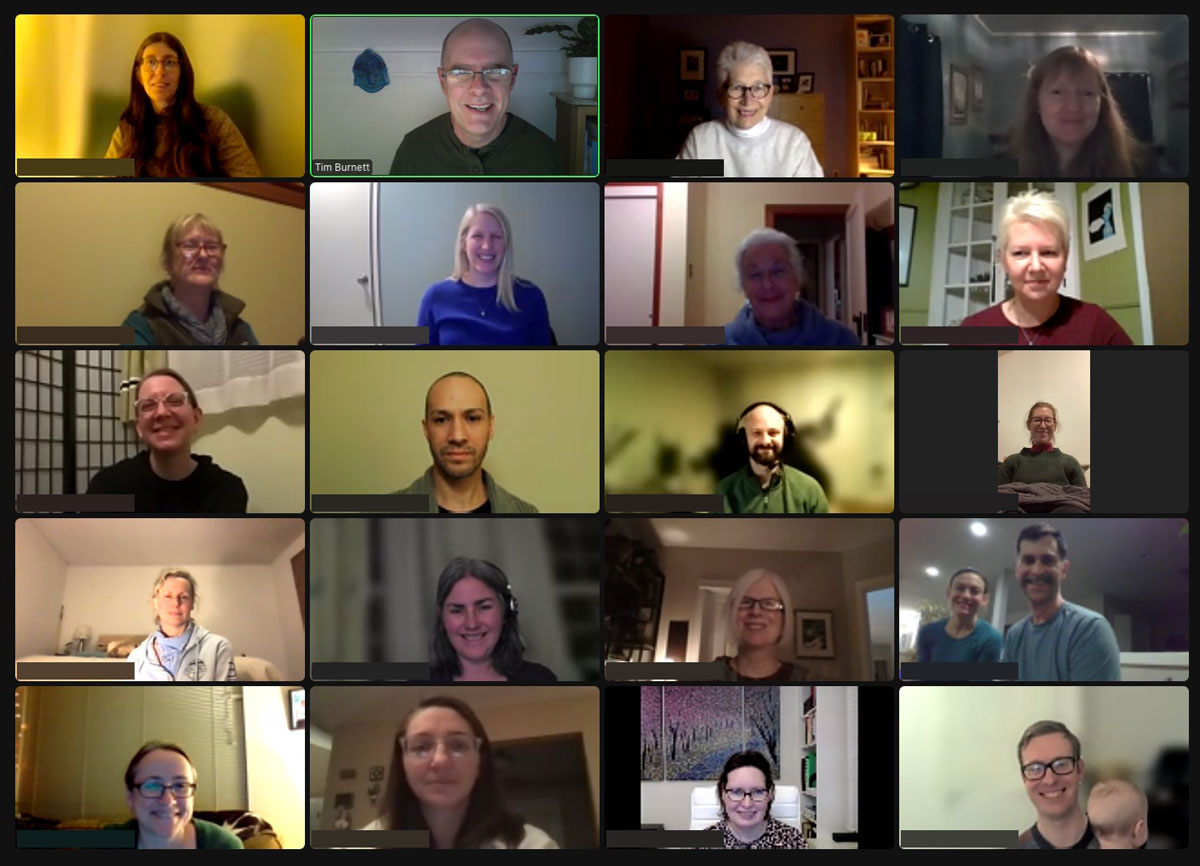
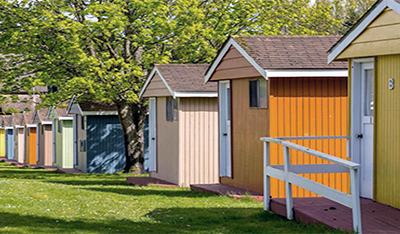
 WHAT TO BRING
WHAT TO BRING